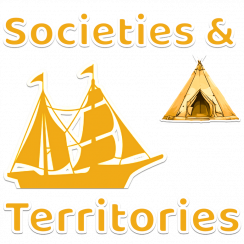
Chez les Algonquiens, la vie politique est organisée autour des nations et des bandes. Chaque nation est divisée en plusieurs clans qui eux, sont indépendants les uns des autres. Ils partagent une même langue, des coutumes et un mode de vie semblables mais ils ont chacun leur territoire de chasse, de pêche et de cueillette. Les clans regroupent les membres de familles qui ont des ancêtres communs. À l’intérieur des clans, on retrouve des bandes, qui sont formées de 35 à 75 personnes provenant de deux ou trois familles qui se déplacent ensemble durant les mois d’hiver.
Les guerres entre les nations
Avant l’arrivée des Européens, il y avait plusieurs conflits entre les nations amérindiennes. Les Amérindiens entraient souvent en guerre à propos de la protection des territoires de chasse et de pêche, et des routes qu’ils utilisaient pour faire le commerce Ils entraient aussi en guerre pour venger la mort de certains membres de leur groupe lors de guerres précédentes.

